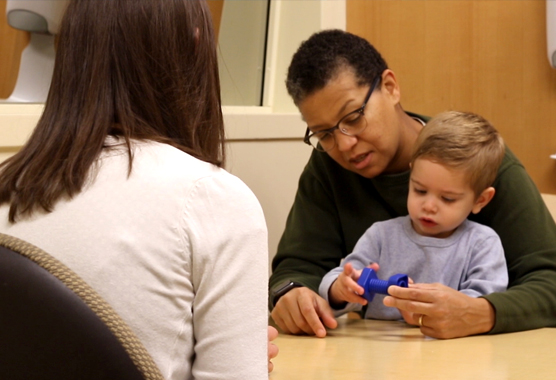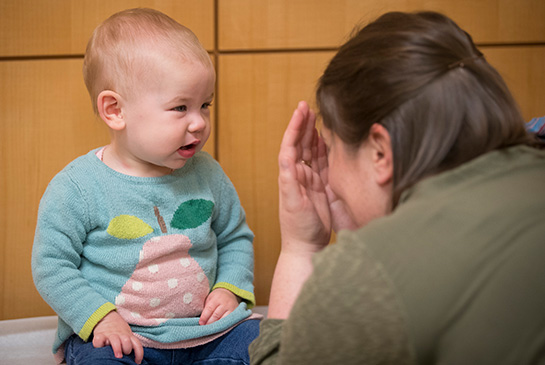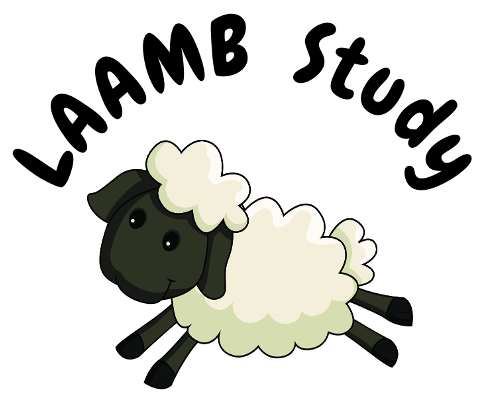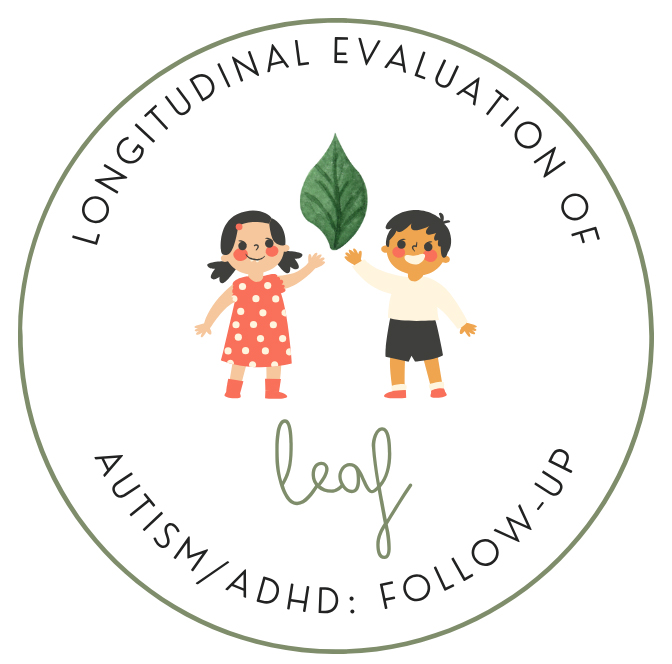Miller Lab
Identifying the early indicators of autism and attention-deficit/hyperactivity disorder (ADHD) in infants and toddlers.

About Our Research
The goal of our work is to uncover early signs of autism and ADHD in infants and toddlers, and to better understand the links between these two conditions. We closely track the development of infants and toddlers to gain a better understanding of their attention skills, emotion regulation, self-control, and social and communication skills over the first few years of life.
Through this work, we strive to improve and establish new methods of early detection of autism and ADHD so that families can access earlier intervention for their children to help them thrive.


The goal of the Early Risk Study was to understand the earliest signs of autism and ADHD. This study focused on younger siblings of children with autism, younger siblings of children with ADHD, and children of parents with ADHD – all of whom are at elevated likelihood for these conditions – as well as younger siblings of typically developing children. We followed the development of infants and toddlers at high and low risk for autism and ADHD multiple times from early in life through age 3, monitoring early attention skills, communication, motor activity, self-control, social skills, and play behaviors. We used a variety of methods including eye tracking, interactive tasks between the infant/toddler and an examiner, and parent interviews. At age 3, diagnostic determinations (autism, ADHD concerns, etc.) were made. The ultimate goal of this study was to understand the links between autism and ADHD, and to determine which behaviors early in life differ vs. overlap between infants/toddlers who develop these conditions. We hope that this research will help to improve early identification of autism and ADHD, and that it might lead to treatments that can be applied across various groups of children with, or at risk for, a range of neurodevelopmental concerns.
Although we are no longer recruiting for this study, we are eager to see the families and children who generously volunteered their time to participate again in the future. We hope to reach out to all participating families sometime in the next few years.

The “Learning about Autism and ADHD Markers in Babies,” or LAAMB, Study seeks to understand early markers of self-regulation and social communication symptoms across early development, with a focus on attention regulation, emotion regulation, and psychophysiological indicators. The goal is that this research will improve early identification of disabilities like autism and ADHD, and encourage the development of interventions that can be applied across a range of infants and toddlers at risk.
Similar to our previous studies, this study is focused on infant siblings of children with autism, infant siblings of children with ADHD, and infants of parents with ADHD – all of whom are at elevated likelihood for these conditions – as well as infant siblings of typically developing children. We follow the development of these infants multiple times between 6 and 36 months of age, monitoring early attention skills, emotion regulation, self-control, social and communication skills, and play behaviors. We use a variety of methods including eye tracking, measurement of physiological regulation (e.g., heart rate), interactive tasks between the infant/toddler and an examiner, parent-child play, and parent interviews. At age 3, diagnostic determinations (autism, ADHD concerns, etc.) are made.
This study is funded by a grant from the National Institute of Mental Health (NIMH R01 MH121416). Our collaborator on this project is Dr. Erica Musser from Florida International University.
Although we are no longer recruiting for this study, we are excited to welcome back the families and children who generously volunteered their time. When participants reach age 7–8, they will be invited to join the LEAF Study, which is supported by a new NIH grant. We look forward to reaching out to all families who previously participated in the LAAMB Study.

We have been honored to work with many families over the past 10 years. Over time, we’ve become interested in exploring the ways in which early contextual influences shape long-term outcomes of infants at elevated likelihood for ADHD and autism. In the LEAF study, we’re following the more than 300 infants who participated in our prior studies (Early Risk Study, LAAMB Study) into middle childhood, when they’re between 6-11 years old. The overall goal of the LEAF study is to understand the longer-term development of these infants, and to evaluate the influence of early-life parent-child engagement on middle childhood outcomes. We’re especially interested in understanding both strengths and challenges in self-regulation and social competence as these children grow. This study is funded by the National Institute of Mental Health (NIMH, R01MH137613).
Who can participate?
Children between 6 and 11 years of age who previously participated in the Early Risk Study or the Learning about Autism and ADHD Markers in Babies (LAAMB) Study.
What can families expect?
- A one-time follow-up visit to the UC Davis MIND Institute with your child.
- A written report on your child’s development and behavior, including verbal
feedback from experts. - Caregivers will receive a $50 Visa gift card, and the child will receive a $25 Visa gift card.
- The child’s teacher will also receive a $25 Amazon e-gift code for completing the online questionnaires.
Volunteer Research Assistants Needed!
Would you like to learn about the research process? We are seeking volunteer research assistants who are detail-oriented, motivated, work well both independently and as part of a team, have an interest in autism and ADHD, and are eager to learn. Research assistants should be able to dedicate 9 hours per week for at least 1 calendar year (12 months). If you have any questions or wish to apply, please email us at millerlab@health.ucdavis.edu.
Findings and Selected Publications
Work in our lab and collaborative work with other research groups have resulted in a number of discoveries.

